1
If one wanted to depict the whole thing graphically, every episode, with its climax, would require a three-dimensional, or, rather, no model: every experience is unrepeatable. What makes lovemaking and reading resemble each other most is that within both of them times and spaces open, different from measurable time and space.Italo Calvino
2
Sections in the bookstore- Books You Haven't Read- Books You Needn't Read- Books Made for Purposes Other Than Reading- Books Read Even Before You Open Them Since They Belong to the Category of Books Read Before Being Written- Books That If You Had More Than One Life You Would Certainly Also Read But Unfortunately Your Days Are Numbered- Books You Mean to Read But There Are Others You Must Read First- Books Too Expensive Now and You'll Wait 'Til They're Remaindered- Books ditto When They Come Out in Paperback- Books You Can Borrow from Somebody- Books That Everybody's Read So It's As If You Had Read Them, Too- Books You've Been Planning to Read for Ages- Books You've Been Hunting for Years Without Success- Books Dealing with Something You're Working on at the Moment- Books You Want to Own So They'll Be Handy Just in Case- Books You Could Put Aside Maybe to Read This Summer- Books You Need to Go with Other Books on Your Shelves- Books That Fill You with Sudden, Inexplicable Curiosity, Not Easily Justified- Books Read Long Ago Which It's Now Time to Re-read- Books You've Always Pretended to Have Read and Now It's Time to Sit Down and Really Read Them .Italo Calvino
3
I was living and dying in all the fibers of what is chewed and digested and in all the fibers that absorb the sun, consuming and digesting. Under the thatched arbor of a restaurant on a river-bank, where Olivia had waited for me, our teeth began to move slowly, with equal rhythm, and our eyes stared into each other's with the intensity of serpents'–serpents concentrated in the ecstasy of swallowing each other in turn, as we were aware, in our turn, of being swallowed by the serpent that digests us all, assimilated ceaselessly in the process of ingestion and digestion, in the universal cannibalism that leaves its imprint on every amorous relationship and erases the lines between our bodies and sopa de frijoles, huachinango a la vera cru-zana, and enchiladas.Italo Calvino
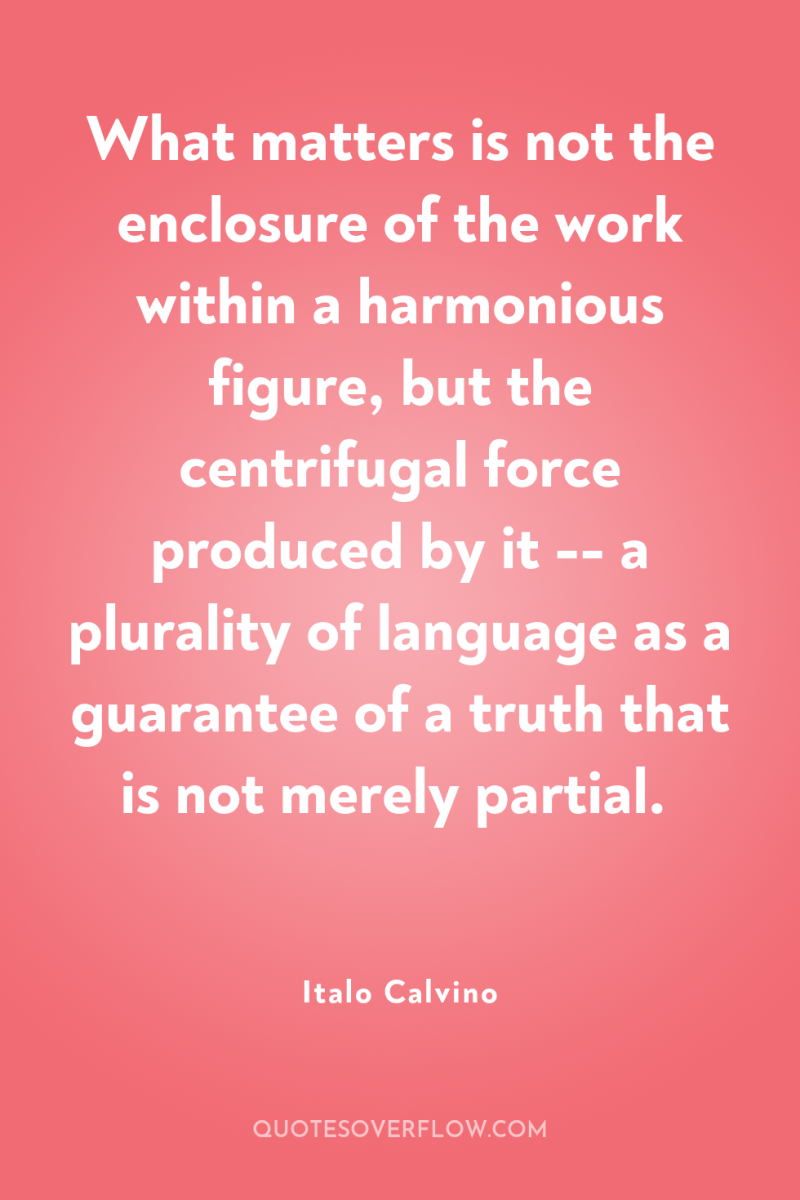
4
What matters is not the enclosure of the work within a harmonious figure, but the centrifugal force produced by it -- a plurality of language as a guarantee of a truth that is not merely partial.Italo Calvino
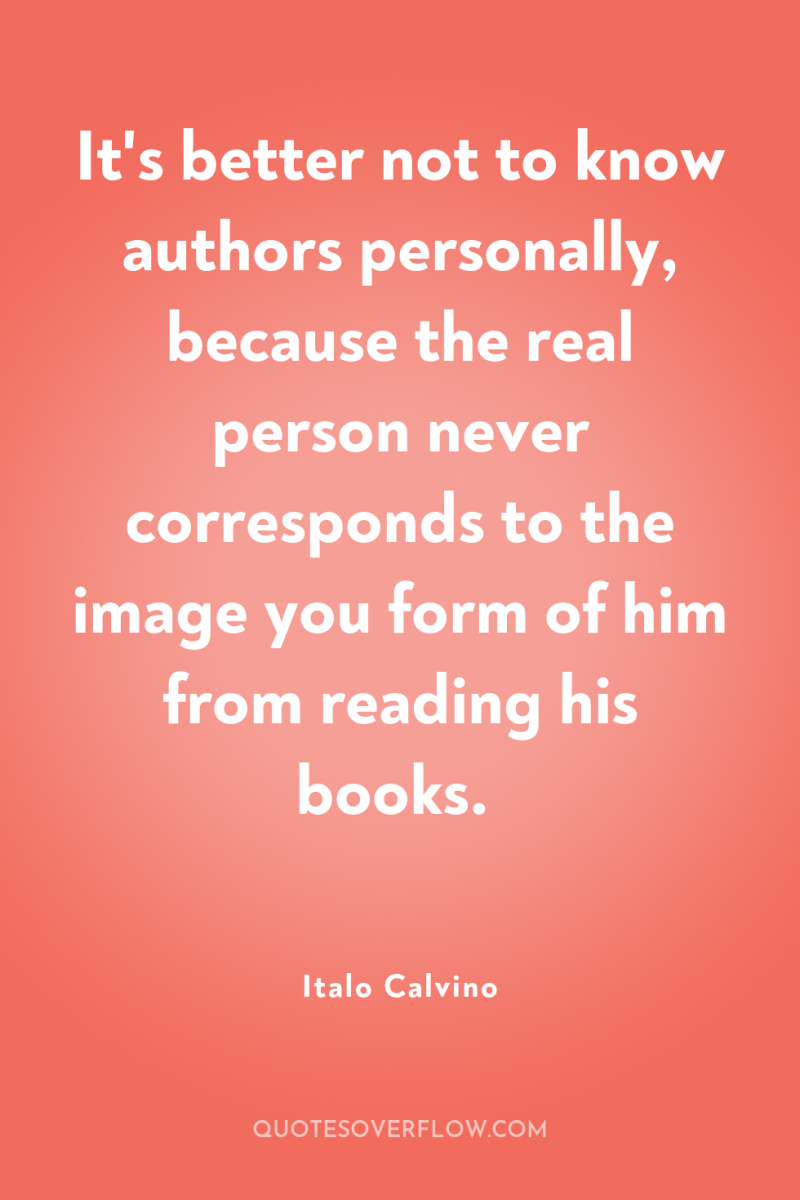
5
It's better not to know authors personally, because the real person never corresponds to the image you form of him from reading his books.Italo Calvino
6
What is more natural than that a solidity, a complicity, a bond should be established between Reader and Reader, thanks to the book? You can leave the bookshop content, you, a man who thought that the period where you could still expect something from life had ended. You are bearing with you two different expectations, and both promise days of pleasant hopes; the expectation contained in the book - of a reading experience you are impatient to resume - and the expectation contained in that telephone number - of hearing again the vibrations, a times treble and at times smoldering, of that voice, when it will answer your first phone call in a while, in fact tomorrow, with the fragile pretext of the book, to ask her if she likes it or not, to tell her how many pages you have read or not read, to suggest to her that you meet again..Italo Calvino
7
The things that the novel does not say are necessarily more numerous than those it does say and only a special halo around what is written can give the illusion that you are reading also what is not written.Italo Calvino
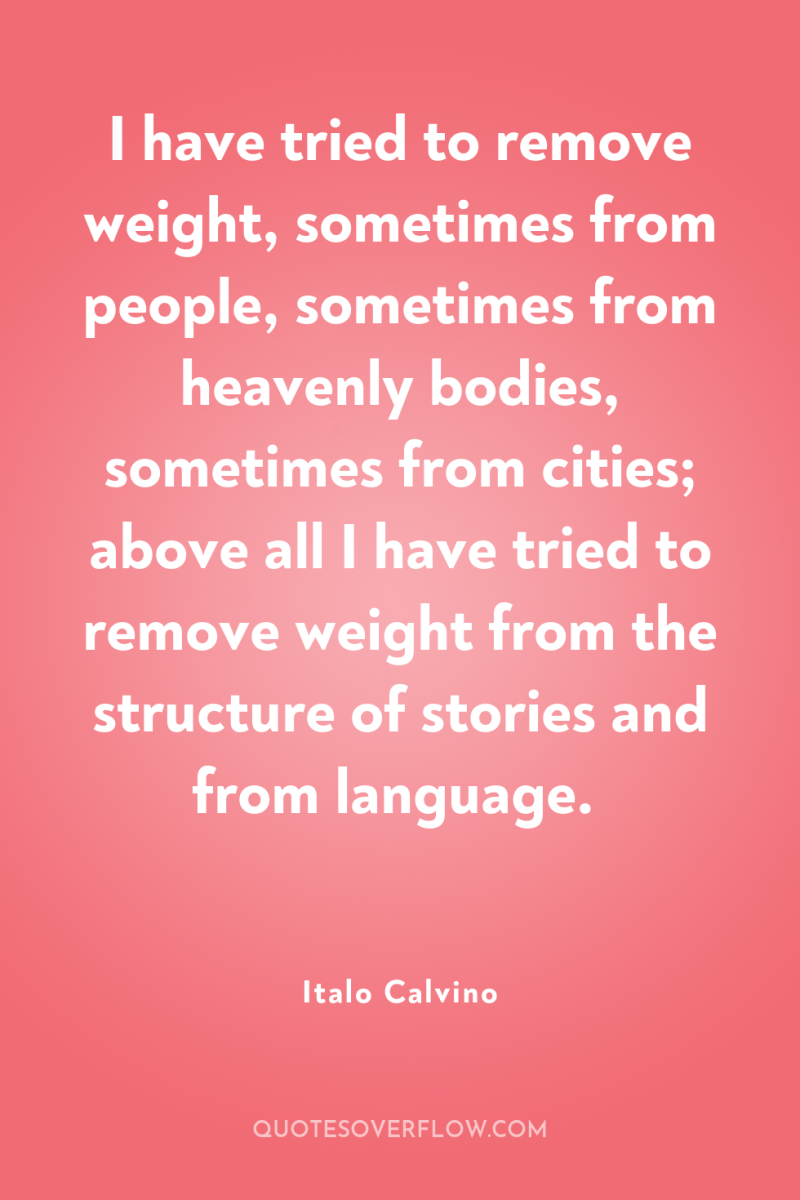
8
I have tried to remove weight, sometimes from people, sometimes from heavenly bodies, sometimes from cities; above all I have tried to remove weight from the structure of stories and from language.Italo Calvino
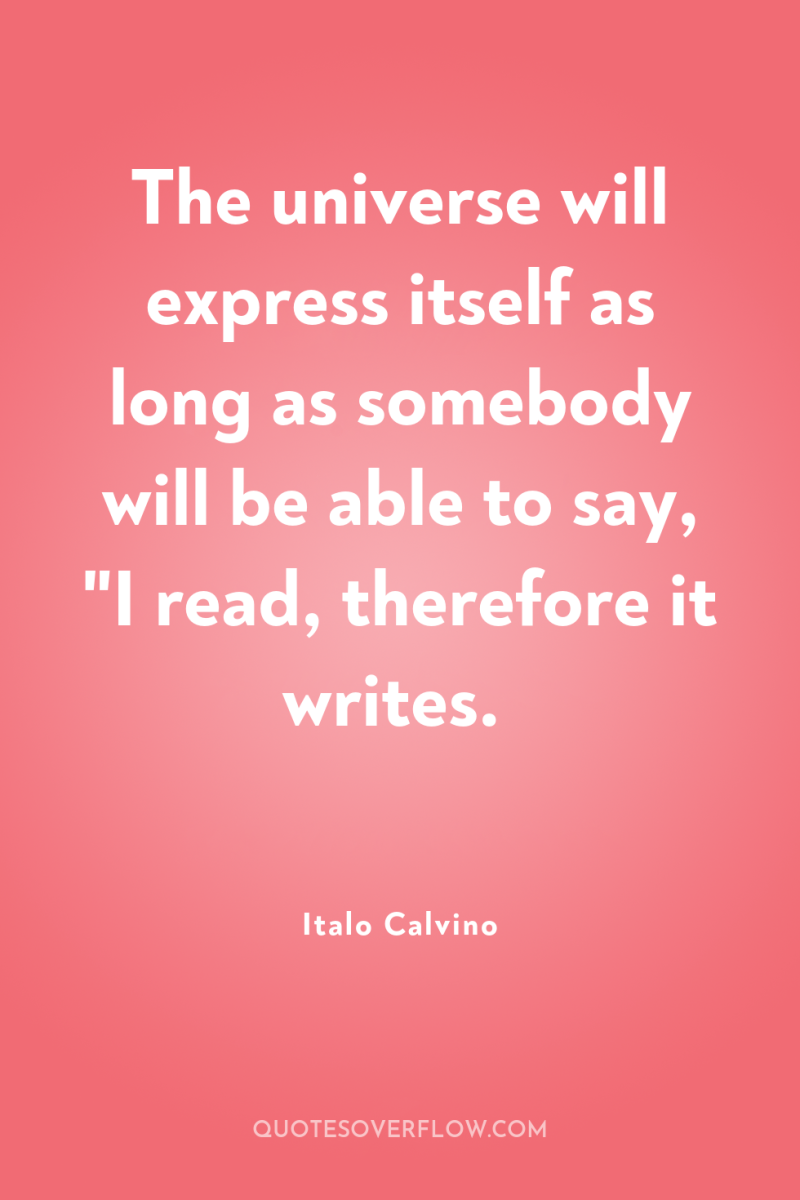
9
The universe will express itself as long as somebody will be able to say, "I read, therefore it writes.Italo Calvino
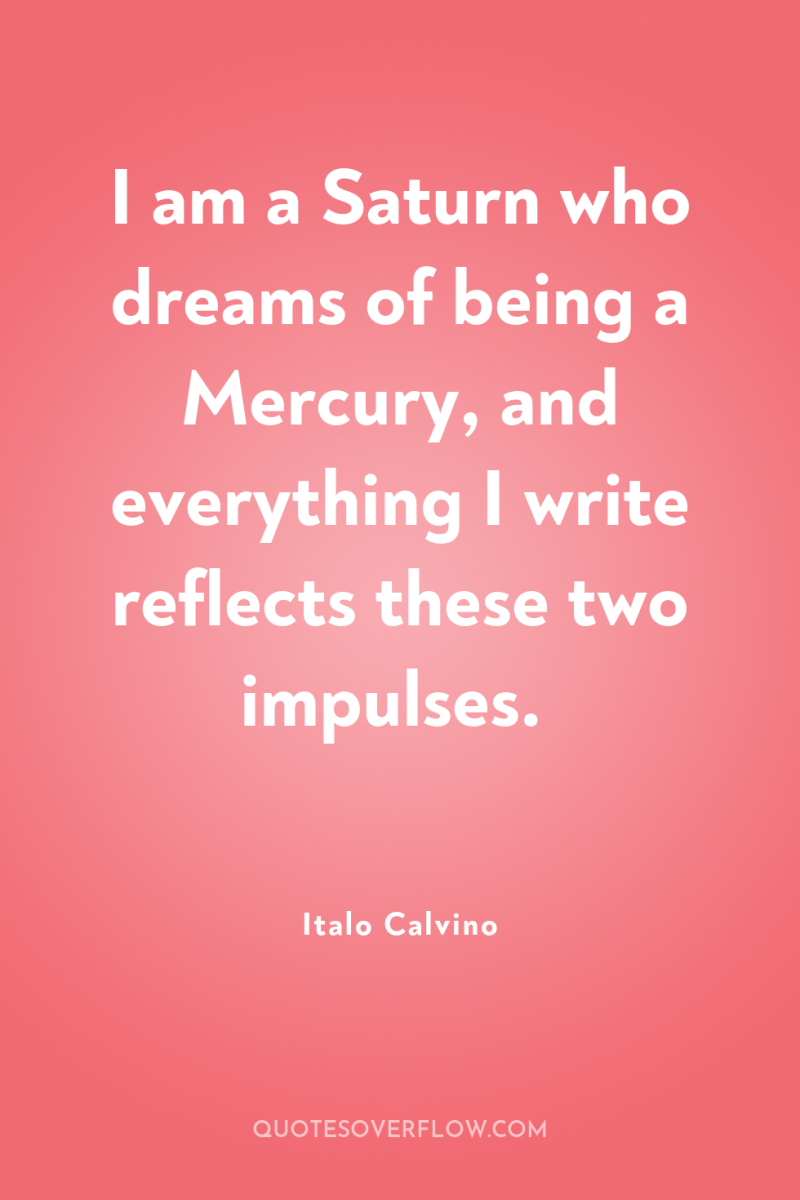
10
I am a Saturn who dreams of being a Mercury, and everything I write reflects these two impulses.Italo Calvino
11
Writing always means hiding something in such a way that it then is discovered; because the truth that can come from my pen is like a shard that has been chipped from a great boulder by a violent impact, then flung far away; because there is no certitude outside falsification.Italo Calvino
12
How well I would write if I were not here! If between the white page and the writing of words and stories that take shape and disappear without anyone's ever writing them there were not interposed that uncomfortable partition which is my person! Style, taste, individual philosophy, subjectivity, cultural background, real experience, psychology, talent, tricks of the trade: all the elements that make what I write recognizable as mine seem to me a cage that restricts my possibilities. If I were only a hand, a severed hand that grasps a pen and writes..who would move this hand? The anonymous throng? The spirit of the times? The collective unconscious? I do not know.Italo Calvino
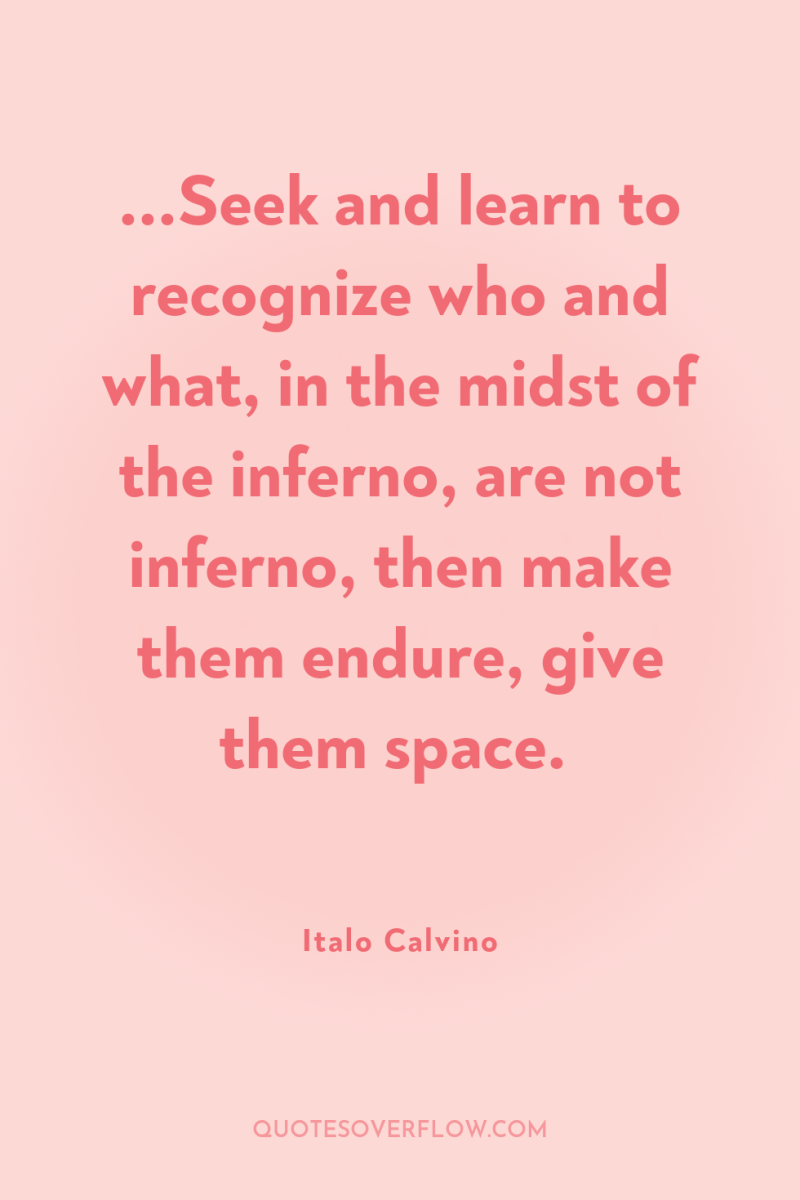
13
...Seek and learn to recognize who and what, in the midst of the inferno, are not inferno, then make them endure, give them space.Italo Calvino
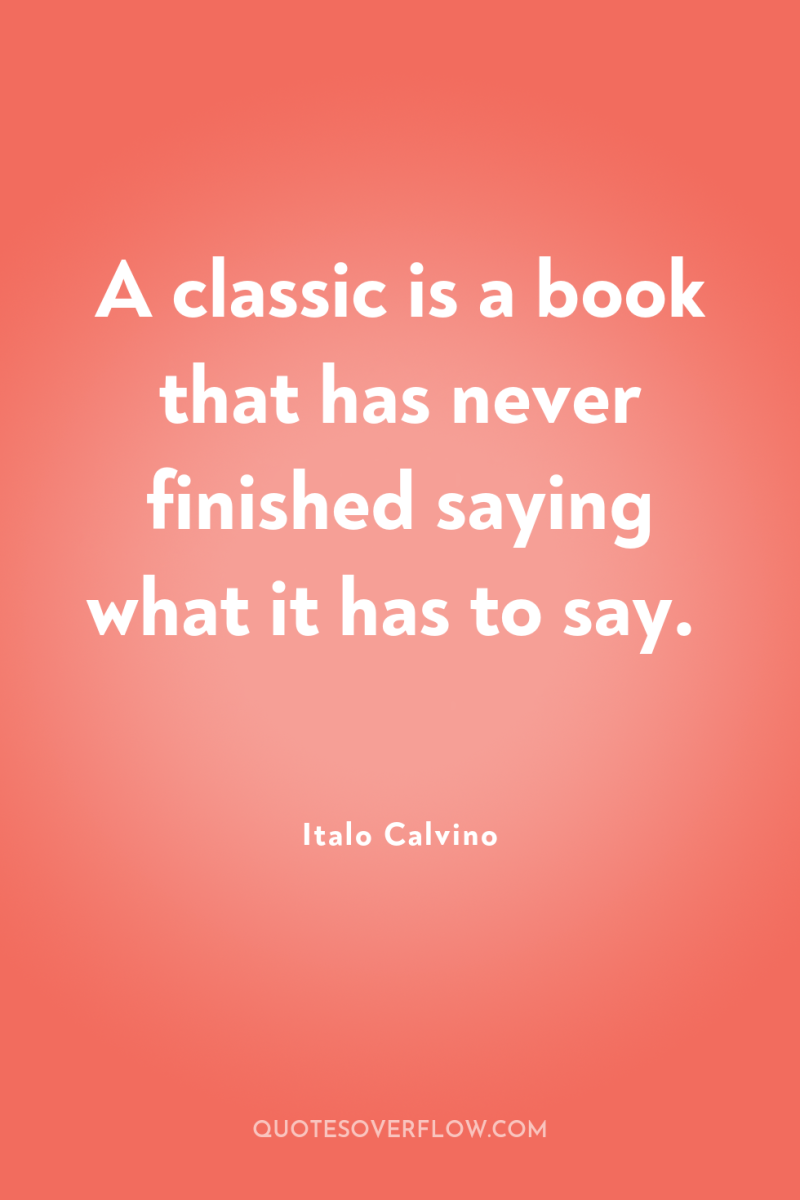
14
A classic is a book that has never finished saying what it has to say.Italo Calvino
15
In the shop window you have promptly identified the cover with the title you were looking for. Following this visual trail, you have forced your way through the shop past the thick barricade of Books You Haven't Read, which are frowning at you from the tables and shelves, trying to cow you.. And thus you pass the outer girdle of ramparts, but then you are attacked by the infantry of Books That If You Had More Than One Life You Would Certainly Also Read But Unfortunately Your Days Are Numbered. With a rapid maneuver you bypass them and move into the phalanxes of the Books You Mean To Read But There Are Others You Must Read First, the Books Too Expensive Now And You'll Wait Till They're Remaindered, the Books ditto When They Come Out in Paperback, Books You Can Borrow From Somebody, Books That Everybody's Read So It's As If You Had Read Them, Too. .Italo Calvino
16
In the shop window you have promptly identified the cover with the title you were looking for. Following this visual trail, you have forced your way through the shop past the thick barricade of Books You Haven't Read, which were frowning at you from the tables and shelves, trying to cow you. But you know you must never allow yourself to be awed, that among them there extend for acres and acres the Books You Needn't Read, the Books Made For Purposes Other Than Reading, Books Read Even Before You Open Them Since They Belong To The Category Of Books Read Before Being Written. And thus you pass the outer girdle of ramparts, but then you are attacked by the infantry of the Books That If You Had More Than One Life You Would Certainly Also Read But Unfortunately Your Days Are Numbered. With a rapid maneuver you bypass them and move into the phalanxes of the Books You Mean To Read But There Are Others You Must Read First, the Books Too Expensive Now And You'll Wait Till They're Remaindered, the Books ditto When They Come Out In Paperback, Books You Can Borrow From Somebody, Books That Everybody's Read So It's As If You Had Read Them, Too. Eluding these assaults, you come up beneath the towers of the fortress, where other troops are holding out:the Books You've Been Planning To Read For Ages, the Books You've Been Hunting For Years Without Success, the Books Dealing With Something You're Working On At The Moment, the Books You Want To Own So They'll Be Handy Just In Case, the Books You Could Put Aside Maybe To Read This Summer, the Books You Need To Go With Other Books On Your Shelves, the Books That Fill You With Sudden, Inexplicable Curiosity, Not Easily Justified, Now you have been able to reduce the countless embattled troops to an array that is, to be sure, very large but still calculable in a finite number; but this relative relief is then undermined by the ambush of the Books Read Long Ago Which It's Now Time To Reread and the Books You've Always Pretended To Have Read And Now It's Time To Sit Down And Really Read Them.Italo Calvino
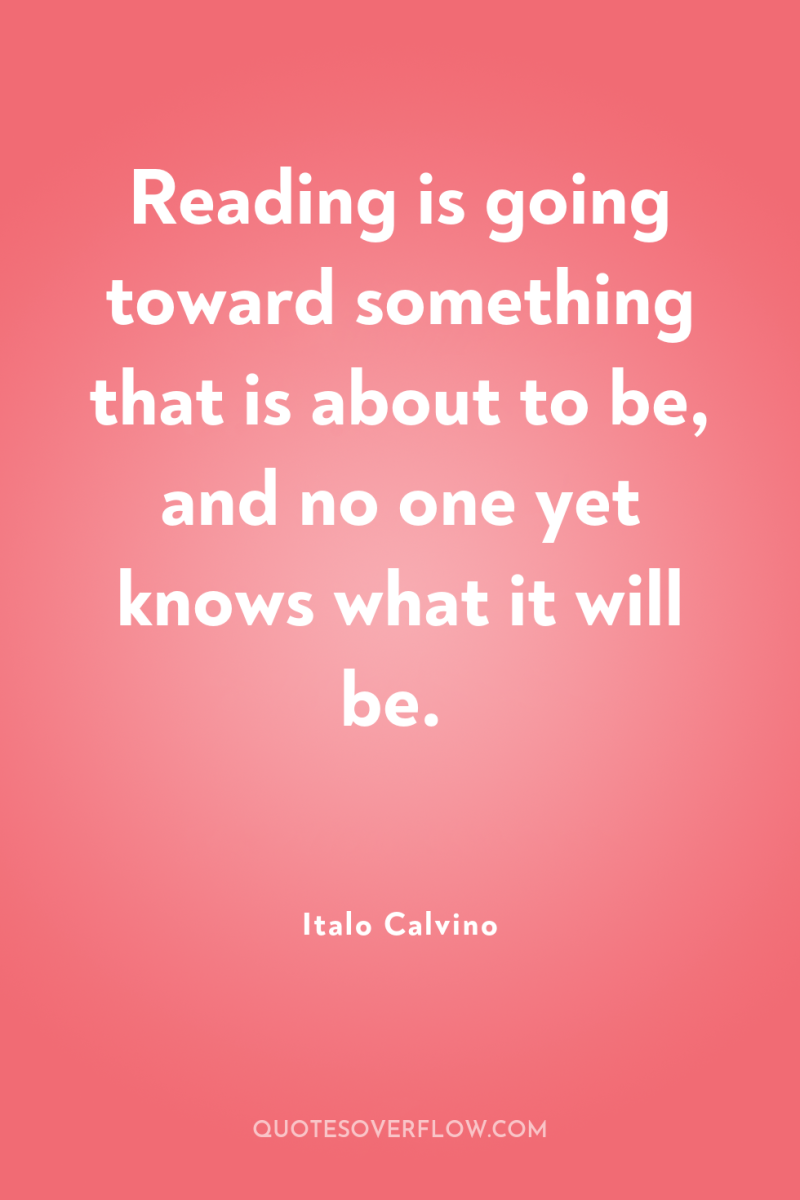
17
Reading is going toward something that is about to be, and no one yet knows what it will be.Italo Calvino
18
Your house, being the place in which you read, can tell us the position books occupy in your life, if they are a defense you set up to keep the outside world at a distance, if they area dream into which you sink as if into a drug, or bridges you cast toward the outside, toward the world that interests you so much that you want to multiply and extend its dimensions through books.Italo Calvino
19
You turn the book over in your hands, you scan the sentences on the back of the jacket, generic phrases that don't say a great deal. So much the better, there is no message that indiscreetly outshouts the message that the book itself must communicate directly, that you must extract from the book, however much or little it may be. Of course, this circling of the book, too, this reading around it before reading inside it, is a part of the pleasure in a new book, but like all preliminary pleasures, it has its optimal duration if you want it to serve as a thrust toward the more substantial pleasure of the consummation of the act, namely the reading of the book.Italo Calvino
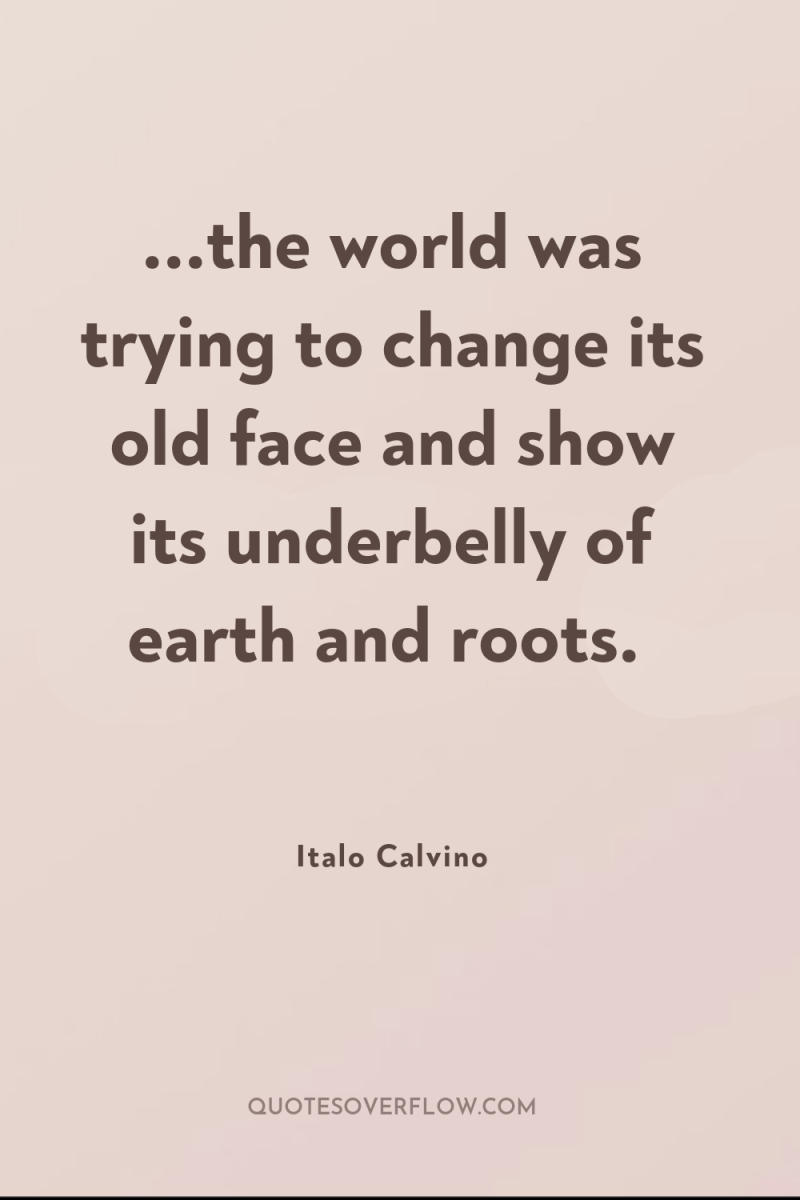
20
...the world was trying to change its old face and show its underbelly of earth and roots.Italo Calvino
21
To fall asleep like a bird. To have a wing you could stick your head under, aworld of branches suspended above the earthly world, barely glimpsed downbelow, muffled and remote. Once you begin rejection your present state, there is no knowing where you can arrive.Italo Calvino
22
Now that he is no longer here I should be interested in so many things: philosophy, politics, history. I follow the news, read books, but they befuddle me. What he meant to say is not there, for he understood something else, something that was all-embracing, and he could not say it in words but only by living as he did.Italo Calvino
23
Perhaps everything lies in knowing what words to speak, what actions to perform, and in what order and rhythm; or else someone's gaze, answer, gesture is enough; it is enough for someone to do something for the sheer pleasure of doing it, and for his pleasure to become the pleasure of others: at that moment, all spaces change, all heights, distances; the city is transfigured, becomes crystalline, transparent as a dragonfly.Italo Calvino
24
Don't be amazed if you see my eyes always wandering. In fact, this is my way of reading, and it is only in this way that reading proves fruitful to me. If a book truly interests me, I cannot follow it for more than a few lines before my mind, having seized on a thought that the text suggests to it, or a feeling, or a question, or an image, goes off on a tangent and springs from thought to thought, from image to image, in an itinerary of reasonings and fantasies that I feel the need to pursue to the end, moving away from the book until I have lost sight of it. The stimulus of reading is indispensable to me, and of meaty reading, even if, of every book, I manage to read no more than a few pages. But those few pages already enclose for me whole universes, which I can never exhaust.Italo Calvino
25
I, too, feel the need to reread the books I have already read, " a third reader says, "but at every rereading I seem to be reading a new book, for the first time. Is it I who keep changing and seeing new things of which I was not previously aware? Or is reading a construction that assumes form, assembling a great number of variables, and therefore something that cannot be repeated twice according to the same pattern? Every time I seek to relive the emotion of a previous reading, I experience different and unexpected impressions, and do not find again those of before. At certain moments it seems to me that between one reading and the next there is a progression: in the sense, for example, of penetrating further into the spirit of the text, or of increasing my critical detachment. At other moments, on the contrary, I seem to retain the memory of the readings of a single book one next to another, enthusiastic or cold or hostile, scattered in time without a perspective, without a thread that ties them together. The conclusion I have reached is that reading is an operation without object; or that its true object is itself. The book is an accessory aid, or even a pretext.Italo Calvino
26
Don't you ever get tired of reading?" she asked. "You could hardly be called good company! Don't you know that, with women, you're supposed to make conversation?" she added; her half smile was perhaps meant to be ironic, though to Amedeo, who at that moment would have paid anything rather than give up his novel, it seemed downright threatening.Italo Calvino
27
You are about to begin reading Italo Calvino's new novel, If on a Winter's Night a Traveller. Relax. Concentrate. Dispel every other thought. …Tell the others right away, "No, I don't want to watch TV! … I'm reading! I don't want to be disturbed!Italo Calvino
28
Reading, " he says, "is always this: there is a thing that is there, a thing made of writing, a solid material object, which cannot be changed, and through this thing we measure ourselves against something else that is not present, something else that belongs to the immaterial, invisible world, because it can only be thought, imagined, or because it was once and is no longer, past, lost, unattainable, in the land of the dead.."" Or that is not present because it does not yet exist, something desire, feared, possible or impossible, " Ludmilla says. "Reading is going toward something that is about to be, and no one yet knows what it will be..Italo Calvino
29
Something must always remain that eludes us .. For power to have an object on which it can be exercised, a space in which to stretch out its arms .. As long as I know there exists in the world someone who does tricks only for the love of the trick, as long as I know there is a woman who loves reading for reading's sake, I can convince myself that the world continues .. And every evening I, too, abandon myself to reading, like that distant unknown woman .. .Italo Calvino
30
Today each of you is the object of the other’s reading, one reads in the other the unwritten story.Italo Calvino
31
Do you believe that every story must have a beginning and an end? In ancient times a story could end only in tow ways: having passed all the tests, the hero and the heroine married, or else they died. The ultimate meaning to which all stories refer has two faces: the continuity of life, the inevitability of death.Italo Calvino
32
Amedeo loved thick tomes, and in tackling them he felt the physical pleasure of undertaking a great task. Weighing them in his hand, thick, closely printed, squat, he would consider with some apprehension the number of pages, the length of the chapters, then venture into them, a bit reluctant at the beginning, without any desire to perform the initial chore of remembering the names, catching the drift of the story; then he would entrust himself to it, running along the lines, crossing the grid of the uniform page, and beyond the leaden print the flame and fire of battle appeared, the cannonball that, whistling through the sky, fell at the feet of Prince Andrei, and the shop filled with engravings and statues where Frederic Moreau, his heart in his mouth, was to meet the Arnoux family. Beyond the surface of the page you entered a world where life was more alive than here on this side… .Italo Calvino
33
Reading is solitude. One reads alone, even in another's presence.Italo Calvino
34
A person, for example, reads in adulthood a book that is important for him, and it makes him say, "How could I have lived without reading it! " and also, "What a pity I did not read it in my youth! " Well, these statements do not have much meaning, especially the second, because after he has read that book, his life becomes the life of a person who has read that book, and it is of little importance whether he read it early or late, because now his life before that reading also assumes a form shaped by that reading.Italo Calvino
35
Listening to someone read aloud is very different from reading in silence. When you read, you can stop or skip sentences: you are the one who sets the pace. When someone else is reading, it is difficult to make your attention coincide with the tempo of his reading: the voice goes either too fast or too slow. And then, listening to someone who is translating from another language involves a fluctuation, a hesitation over the words, a margin of indecision, something vague, tentative. The text, when you are the reader, is something that is there, against which you are forced to clash; when someone translates it aloud to you, it is something that is and is not there, that you cannot manage to touch.Italo Calvino
36
You walk for days among trees and among stones. Rarely does the eye light on a thing, and then only when it has recognized that thing as the sign of another thing: a print in the sand indicates the tiger's passage; a marsh announces a vein of water; the hibiscus flower, the end of winter. All the rest is silent and interchangeable; trees and stones are only what they are.Italo Calvino
37
That wish to enter into an elusive element which had urged Cosimo into the trees, was still working now inside him unsatisfied, making him long for a more intimate link, a relationship which would bind him to each leaf and twig and feather and flutter.Italo Calvino
38
The obstinacy on which power is based is never so fragile as in the moment of its triumph.Italo Calvino
39
You only have to start saying of something : 'Ah, how beautiful ! We must photograph it ! ' and you are already close to the view of the person who thinks that everything that is not photographed is lost, as if it never existed, and therefore in order to really live you must photograph as much as you can, and to photograph as much as you can you must either live in the most photographable way possible, or else consider photographable every moment of your life.Italo Calvino
40
The city of Leonia refashions itself every day: every morning the people wake between fresh sheets, wash with just-unwrapped cakes of soap, wear brand-new clothing, take from the latest model refrigerator still unopened tins, listening to the last-minute jingles from the most up-to-date radio. On the sidewalks, encased in spotless plastic bags, the remains of yesterday's Leonia await the garbage truck. Not only squeezed tubes of toothpaste, blown-out light bulbs, newspapers, containers, wrappings, but also boilers, encyclopedias, pianos, porcelain dinner services. It is not so much by the things that each day are manufactured, sold, bought, that you can measure Leonia's opulence, but rather by the things that each day are thrown out to make room for the new. So you begin to wonder if Leonia's true passion is really , as they say, the enjoyment of new things, and not, instead, the joy of expelling, discarding, cleansing itself of a recurrent impurity. The fact is that street cleaners are welcomed like angels.Italo Calvino
41
If one starts to draw comparisons between what is and what is not, it is the poorer qualities of the former that strike you, the impurities, the flaws; in short, you can only really feel safe with nothingness.Italo Calvino
42
Her breast was young, the nipples rosy. Cosimo just grazed it with his lips, before Viola slid away over the branches as if she were flying, with him clambering after her, and that skirt of hers always in his faceItalo Calvino
43
...eyes that, like those of children, look at an eternal present without forgiveness.Italo Calvino
44
It was the love which the hunter has for living things, and which he can only express by aiming his gun at them ...Italo Calvino
45
Each city receives its form from the desert it opposes.Italo Calvino
46
Who are we, who is each one of us, if not a combinatoria of experiences, information, books we have read, things imagined?Italo Calvino
47
Nobody these days holds the written word in such high esteem as police states do.Italo Calvino
48
There is nothing for it but for all of us to invent our own ideal libraries of classics. I would say that such a library ought to be composed half of books we have read and that have really counted for us, and half of books we propose to read and presume will come to count–leaving a section of empty shelves for surprises and occasional discoveriesItalo Calvino
49
If the ancients had been able to see it as I see it now, Mr. Palomar thinks, they would have thought they had projected their gaze into the heaven of Plato's ideas, or in the immaterial space of the postulates of Euclid; but instead, thanks to some misdirection or other, this sight has been granted to me, who fear it is too beautiful to be true, too gratifying to my imaginary universe to belong to the real world. But perhaps it is this same distrust of our senses that prevents us from feeling comfortable in the universe. Perhaps the first rule I must impose on myself is this: stick to what I see. .Italo Calvino
50
In an age when other fantastically speedy, widespread media are triumphing, and running the risk of flattening all communication onto a single homogeneous surface, the function of literature is communication between things that are different simply because they are different, not blunting but even sharpening the differences between them, following the true bent of written language.Italo Calvino
51
I think that my first impulse arises from a hypersensitivity or allergy. It seems to me that language is always used in a random, approximate, careless manner, and this distresses me unbearably. Please don't think that my reaction is the result of intolerance towards my neighbor: the worst discomfort of all comes from hearing myself speak. That's why I try to talk as little as possible. If I prefer writing, it is because I can revise each sentence until I reach the point where - if not exactly satisfied with my words - I am able at least to eliminate those reasons for dissatisfaction that I can put a finger on. Literature - and I mean the literature that matches up to those requirements - is the promised land in which language becomes what it really ought to be.Italo Calvino
52
Overambitious projects may be objectionable in many fields, but not in literature. Literature remains alive only if we set ourselves immeasurable goals, far beyond all hope of achievement.Italo Calvino
53
A classic is a book that has never finished what it wants to say.Italo Calvino
54
This is the paradox of the power of literature: it seems that only when it is persecuted does it show its true powers, challenging authority, whereas in our permissive society it feels that it is being used merely to create the occasional pleasing contrast to the general ballooning of verbiage.Italo Calvino
55
I am the man who comes and goes between the bar and the telephone booth. Or, rather:that man is called 'I' and you know nothing else about him, just as this station is called only 'station' and beyond it there exists nothing except the unanswered signal of a telephone ringing in a dark room of a distant city.Italo Calvino
56
It can also be useful to politics, enabling that science to discover how much of it is no more than verbal construction, myth, literary tops. Politics, like literature, must above all know itself and distrust itself. As a final observation, I should like to add that it is impossible today for anyone to feel innocent, if in whatever we do or say we can discover a hidden motive - that of a white man, or a male, or the possessor of a certain income, or a member of a given economic system, or a sufferer from a certain neurosis - this should not induce in us either a universal sense of guilt or an attitude of universal accusation. When we become aware of our disease or of our hidden motives, we have already begun to get the better of them. What matters is the way in which we accept our motives and live through the ensuing crisis. This is the only chance we have of becoming different from the way we are - that is, the only way of starting to invent a new way of being.Italo Calvino
57
There are days when everything I see seems to me charged with meaning: messages it would be difficult for me to communicate to others, define, translate into words, but which for this very reason appear to me decisive. They are announcements or presages that concern me and the world at once: for my part, not only the external events of my existence but also what happens inside, in the depths of me; and for the world, not some particular event but the general way of being of all things.Italo Calvino
58
It sometimes seems to me that a pestilence has struck the human race in its most distinctive faculty - that is, the use of words. It is a plague afflicting language, revealing itself as a loss of cognition and immediacy, an automatism that tends to level out all expression into the most generic, anonymous, and abstract formulas, to dilute meaning, to blunt the edge of expressiveness, extinguishing the sparks that shoots out from the collision of words and new circumstances.Italo Calvino
59
To fall in the void as I fell: none of you knows what that means… I went down into the void, to the most absolute bottom conceivable, and once there I saw that the extreme limit must have been much, much farther below, very remote, and I went on falling, to reach it.Italo Calvino
60
It was the hour in which objects lose the consistency of shadow that accompanies them during the night and gradually reacquire colors, but seem to cross meanwhile an uncertain limbo, faintly touched, just breathed on by light; the hour in which one is least certain of the world's existence.Italo Calvino
61
…Marco’s answers and objections took their place in a discourse already proceeding on its own, in the Great Khan’s head. That is to say, between the two of them it did not matter whether questions and solutions were uttered aloud or whether each of the two went on pondering in silence. In fact, they were silent, their eyes half-closed, reclining on cushions, swaying in hammocks, smoking long amber pipes. Marco Polo imagined answering (or Kublai Khan imagined his answer) that the more one was lost in unfamiliar quarters of distant cities, the more one understood the other cities he had crossed to arrive there….Italo Calvino
62
The city, however, does not tell its past, but contains it like the lines of a handItalo Calvino
63
The real protagonist of the story, however, is the magic ring, because it is the movements of the ring that determine those of the characters and because it is the ring that establishes the relationships between them. Around the magic object there forms a kind of force field that is in fact the territory of the story itself. We might say that the magic object is an outward and visible sign that reveals the connection between people or between events. We might even say that in a narrative any object is always magic.Italo Calvino
64
What he sought was always something lying ahead, and even if it was a matter of the past it was a past that changed gradually as he advanced on his journey, because the traveller's past changes according to the route he has followed: not the immediate past, that is, to which each day that goes by adds a day, but the more remote past. Arriving at each new city, the traveller finds again a past of his that he did not know he had: the foreignness of what you no longer are or no longer possess lies in wait for you in foreign, unpossessed places.Italo Calvino
65
Journeys to relive your past?' was the Khan's question at this point, a question which could also have been formulated: 'Journeys to recover your future?' And Marco's answer was: 'Elsewhere is a negative mirror. The traveller recognizes the little that is his, discovering the much he has not had and willnever have.Italo Calvino
66
Because in this way all I did was to accumulate past after past behind me, multiplying the pasts, and if one life was too dense and ramified and embroiled for me to bear it always with me, imagine so many lives, each with its own past and the pasts of the other lives that continue to become entangled one with the others.Italo Calvino
67
Why d’you make me suffer?"“ Because I love you.” Now it was his turn to get angry. “No, no, you don’t love me! People in love want happiness, not pain! ”“ People in love want only love, even at the cost of pain.”“ Then you’re making people suffer on purpose.”“ Yes, to see if you love me.” The Baron’s philosophy would not go any further. “Pain is a negative state of the soul.” “Love is all.” “Pain should always be fought against.”“ Love refuses nothing.”“ Some things I’ll never admit.”“ Oh yes, you do, now, for you love me and you suffer.Italo Calvino
68
If I were to draw, I would apply myself only to studying the form of inanimate objects, " I said somewhat imperiously, because I wanted to change the subjects and also because a natural inclination does truly lead me to recognise my moods in the motionless suffering of things.Italo Calvino
69
But Ludmilla is always at least one step ahead of you. “I like to know that book exists that I will still be able to read…” she says, sure that existent objects, concrete albeit unknown, must correspond to the strength of her desire. How can you keep up with her, this woman who is always reading another book besides the one before her eyes, a book that does not yet exist, but which, since she wants it, cannot fail to exist? .Italo Calvino
70
He was staring hard, not at his wife and me but at his daughter watching us. In his cold pupil, in the firm twist of his lips, was reflected Madame Miyagi's orgasm reflected in her daughter's gaze.Italo Calvino
71
Your first book is the only one that matters. Perhaps a writer should write only that one. That is the one moment when you make the big leap; the opportunity to express yourself is offered that once, and you untie the knot within you then or never again.Italo Calvino
72
Though I leave the house as little as possible, I have the impression that someone is disturbing my papers. More than once I have discovered that some pages were missing from my manuscripts. A few days afterward I would find the pages in their place again. But often I no longer recognize my manuscripts, as if I had forgotten what I had written, or as if overnight I were so changed that no longer recognized myself in the self of yesterday. .Italo Calvino
73
The proper use of language, for me personally, is one that enables us to approach things (present or absent) with discretion, attention, and caution, with respect for what things (present or absent) communicate without words.Italo Calvino
74
Signs form a language, but not the one you think you know.Italo Calvino
75
Then, all of a sudden, those pea-green lawns where the first scarlet poppies were flowering, those canary-yellow fields which striped the tawny hills sloping down to a sea full of azure glints, all seemed so trivial to me, so banal, so false, so much in contrast with Ayl's person, with Ayl's world, with Ayl's idea of beauty, that I realized her place could never have been out here. And I realized, with grief and fear, that I had remained out here, that I would never again be able to escape those gilded and silvered gleams, those little clouds that turned from pale blue to pink, those green leaves that yellowed every autumn, and that Ayl's perfect world was lost forever, so lost I couldn't even imagine it any more, and nothing was left that could remind me of it, even remotely, nothing except perhaps that cold wall of gray stone.Italo Calvino
76
Amusement has always been the great moving force behind culture.Italo Calvino
77
From mirror to mirror – this is what I happen to dream of – the totality of things, the whole, the entire universe, divine wisdom could concentrate their luminous rays into a single mirror. Or perhaps the knowledge of everything is buried in the soul, and a system of mirrors that would multiply my image would then reveal to me the soul of the universe, which is hidden in mine.Italo Calvino
78
They knew each other. He knew her and so himself, for in truth he had never known himself. And she knew him and so herself, for although she had always known herself she had never been able to recognize it until now.Italo Calvino
79
If I love order, it's not the mark of a character subjected to an inner discipline, a repression of the instincts. In me the idea of an absolutely regular world, symmetrical and methodical, is associated with that first impulse and burgeoning of nature. The rest of your images that associate passion with disorder, love with intemperate overflow - river fire whirlpool volcano - are for me memories of nothingness and listlessness and boredom.Italo Calvino
80
I've been in love for five hundred million years…Italo Calvino
81
When you're young, all evolution lies before you, every road is open to you, and at the same time you can enjoy the fact of being there on the rock, flat mollusk-pulp, damp and happy.Italo Calvino
82
The cemetery is the home of those who are not here, come in.Italo Calvino
83
The seventh reader interrupts you: "Do you believe that every story must have a beginning and an end? In ancient times a story could only end in two ways: having passed all the tests, the hero and heroine married, or else they died. The ultimate meaning to which all stories refer has two faces: the continuity of life, the inevitability of death." You stop for a moment to reflect on these words. Then, in a flash, you decide you want to marry Ludmilla.Italo Calvino
84
Long novels written today are perhaps a contradiction: the dimension of time has been shattered, we cannot love or think except in fragments of time each of which goes off along its own trajectory and immediately disappears.Italo Calvino
85
We'll make an army in the trees and bring the earth and the people on it to their senses.Italo Calvino
86
Reading is solitude.Italo Calvino
87
A human being becomes human not through the casual convergence of certain biological conditions, but through an act of will and love on the part of other people. If this is not the case, then humanity becomes – as it is already to a large extent – no more than a rabbit-warren. But this is no longer a “free-range” warren but a “battery” one, in the conditions of artificiality in which it lives, with artificial light and chemical feed.Italo Calvino
88
Memory's images, once they are fixed in words, are erased.Italo Calvino
89
The word connects the visible trace with the invisible thing, the absent thing, the thing that is desired or feared, like a frail emergency bridge flung over an abyss.Italo Calvino
90
For Leopardi, unhappy hedonist that he was, what is unknown is always more attractive than what is known; hope and imagination are the only consolations for the disappointments and sorrows of experience. Man therefore projects his desire into infinity and feels pleasure only when he is able to imagine that this pleasure has no end.Italo Calvino
91
Although science interests me just because of its efforts to escape from anthropomorphic knowledge, I am nonetheless convinced that our imagination cannot be anything but anthropomorphic.Italo Calvino
92
In fact the problem Leopardi is facing is speculative and metaphysical, a problem in the history of philosophy from Parmenides to Descartes and Kant: the relationship between the idea of infinity as absolute space and absolute time, and our empirical knowledge of space and time.Italo Calvino
93
I, on the contrary, have been convinced for some time that perfection is not produced except marginally and by chance; therefore it deserves no interest at all, the true nature of things being revealed only in disintegration.Italo Calvino
94
As far as you are able to gather from hints scattered through these letters, Apocryphal Power, riven by internecine battles and eluding the control of its founder, Ermes Marana, has broken into two groups: a sect of enlightened followers of the Archangel of Light and a sect of nihilist followers of the Archon of Shadow. The former are convinced that among the false books flooding the world they can track down the few that bear a truth perhaps extrahuman or extraterrestrial. The latter believe that only counterfeiting, mystification, intentional falsehood can represent absolute value in a book, a truth not contaminated by the dominant pseudo truths.Italo Calvino
95
...And meanwhile the Galaxy ran through space and left behind those signs old and new and I still hadn't found mine.Italo Calvino
96
The difference between the true and the false is only a prejudice of ours.Italo Calvino
97
With the smell of beer I try to get the smell of death off me. And only the smell of death will get the smell of beer off you, like all the drinkers whose graves I have to dig.Italo Calvino
98
Again I am torn between the necessity and the impossibility of answering.Italo Calvino
99
In the streets of Cecilia, an illustrious city, I met once a goatherd, driving a tinkling flock along the walls." Man blessed by heaven, " he asked me, stopping, "can you tell me the name of the city in which we are?"" May the gods accompany you! " I cried. "How can you fail to recognise the illustrious city of Cecilia?""Bear with me, " that man answered. "I am a wandering herdsman. Sometimes my goats and I have to pass through cities; but we are unable to distinguish them. Ask me the names of the grazing lands: I know them all, the Meadow between the Cliffs, the Green Slope, the Shadowed Grass. Cities have no name for me: they are places without leaves, separating one pasture from another, and where the goats are frightened at street corners and scatter. The dog and I run to keep the flock together."" I am the opposite of you, " I said. "I recognise only cities and cannot distinguish what is outside them. In uninhabited places each stone and each clump of grass mingles, in my eyes, with every stone and clump.Italo Calvino
100
Cities also believe they are the work of the mind or of chance, but neither the one nor the other suffices to hold up their walls. You take delight not in a city's seven or seventy wonders, but in the answer it gives to a question of yours. or to the question it asks you, forcing you to answer, like Thebes through the mouth of the Sphinx.Italo Calvino